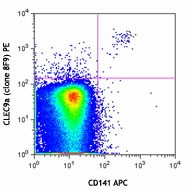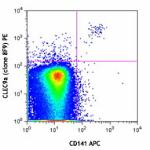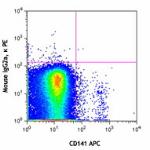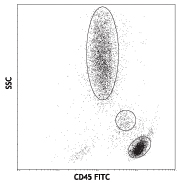- Clone
- 8F9 (See other available formats)
- Regulatory Status
- RUO
- Workshop
- HCDM listed
- Other Names
- C-type lectin family member 9A, CD370
- Isotype
- Mouse IgG2a, κ
- Ave. Rating
- Submit a Review
- Product Citations
- publications

-

Human peripheral blood mononuclear cells were stained with CD3 PerCP, HLA-DR Alexa Fluor® 488, CD141 APC, and CD370 (CLEC9A, clone 8F9) PE (top) or mouse IgG2a, κ PE isotype control (bottom). Data was analyzed with CD3-negative and HLA-DR-positive cell population. -

| Cat # | Size | Price | Quantity Check Availability | Save | ||
|---|---|---|---|---|---|---|
| 353803 | 25 tests | $153 | ||||
| 353804 | 100 tests | $360 | ||||
CD370 (CLEC9A), also known as DNGR1, is a type II transmembrane protein consisting of a single extracellular C-type lectin domain (CTLD) that is connected to the transmembrane domain by a stalk region, and an intracellular cytoplasmic tail with immunoreceptor tyrosine-based activation motif (ITAM). In humans, CLEC9A is strictly expressed on BDCA3-positive conventional dendritic cells (cDC) and CD16- monocytes. CLEC9A recognizes a ubiquitous preformed acid-labile protein associated ligand(s) that is exposed on necrotic cells. CLEC9A ligation is necessary for efficient cross-presentation of dead-cell-associated antigen by recruitment and activation of the tyrosine kinase Syk.
Product DetailsProduct Details
- Verified Reactivity
- Human
- Antibody Type
- Monoclonal
- Host Species
- Mouse
- Formulation
- Phosphate-buffered solution, pH 7.2, containing 0.09% sodium azide and BSA (origin USA)
- Preparation
- The antibody was purified by affinity chromatography and conjugated with PE under optimal conditions.
- Concentration
- Lot-specific (to obtain lot-specific concentration and expiration, please enter the lot number in our Certificate of Analysis online tool.)
- Storage & Handling
- The antibody solution should be stored undiluted between 2°C and 8°C, and protected from prolonged exposure to light. Do not freeze.
- Application
-
FC - Quality tested
- Recommended Usage
-
Each lot of this antibody is quality control tested by immunofluorescent staining with flow cytometric analysis. For flow cytometric staining, the suggested use of this reagent is 5 µl per million cells in 100 µl staining volume or 5 µl per 100 µl of whole blood.
- Excitation Laser
-
Blue Laser (488 nm)
Green Laser (532 nm)/Yellow-Green Laser (561 nm)
- Product Citations
-
- RRID
-
AB_10959651 (BioLegend Cat. No. 353803)
AB_10959651 (BioLegend Cat. No. 353804)
Antigen Details
- Structure
- Type II transmembrane glycoprotein; consists of a 35 amino acid (aa) cytoplasmic domain with an ITAM like motif, a 21 aa transmembrane segment, a 185 aa extracellular domain (ECD) that contains a stalk region, and one C-type lectin domain (CTLD).
- Distribution
-
Dendritic subsets including plasmacytoid dendritic cells.
- Function
- Cross-present antigen to CTL, phagocytosis necrotic cells.
- Interaction
- Necrotic cells.
- Ligand/Receptor
- Ubiquitous preformed acid-labile protein associated ligand(s).
- Cell Type
- Dendritic cells
- Biology Area
- Immunology, Innate Immunity
- Molecular Family
- CD Molecules, MHC Antigens
- Antigen References
-
1. Poulin LF, et al. 2010. J. Exp. Med. 207:1261.
2. Sancho D, et al. 2009. Nature 458:899.
3. Huysamen C, et al. 2008. J. Biol. Chem. 283:16693. - Gene ID
- 283420 View all products for this Gene ID
- Specificity (DOES NOT SHOW ON TDS):
- CD370
- Specificity Alt (DOES NOT SHOW ON TDS):
- CD370
- App Abbreviation (DOES NOT SHOW ON TDS):
- FC
- UniProt
- View information about CD370 on UniProt.org
Related Pages & Pathways
Pages
Related FAQs
- What type of PE do you use in your conjugates?
- We use R-PE in our conjugates.
Other Formats
View All CD370 Reagents Request Custom Conjugation| Description | Clone | Applications |
|---|---|---|
| Purified anti-human CD370 (CLEC9A/DNGR1) | 8F9 | FC |
| PE anti-human CD370 (CLEC9A/DNGR1) | 8F9 | FC |
| APC anti-human CD370 (CLEC9A/DNGR1) | 8F9 | FC |
| TotalSeq™-A0207 anti-human CD370 (CLEC9A/DNGR1) | 8F9 | PG |
| TotalSeq™-C0207 anti-human CD370 (CLEC9A/DNGR1) | 8F9 | PG |
| TotalSeq™-B0207 anti-human CD370 (CLEC9A/DNGR1) | 8F9 | PG |
Customers Also Purchased
Compare Data Across All Formats
This data display is provided for general comparisons between formats.
Your actual data may vary due to variations in samples, target cells, instruments and their settings, staining conditions, and other factors.
If you need assistance with selecting the best format contact our expert technical support team.
-
Purified anti-human CD370 (CLEC9A/DNGR1)
-
PE anti-human CD370 (CLEC9A/DNGR1)

Human peripheral blood mononuclear cells were stained with C... 
-
APC anti-human CD370 (CLEC9A/DNGR1)

Human peripheral blood mononuclear cells were stained with C... -
TotalSeq™-A0207 anti-human CD370 (CLEC9A/DNGR1)
-
TotalSeq™-C0207 anti-human CD370 (CLEC9A/DNGR1)
-
TotalSeq™-B0207 anti-human CD370 (CLEC9A/DNGR1)
 Login/Register
Login/Register 

















Follow Us